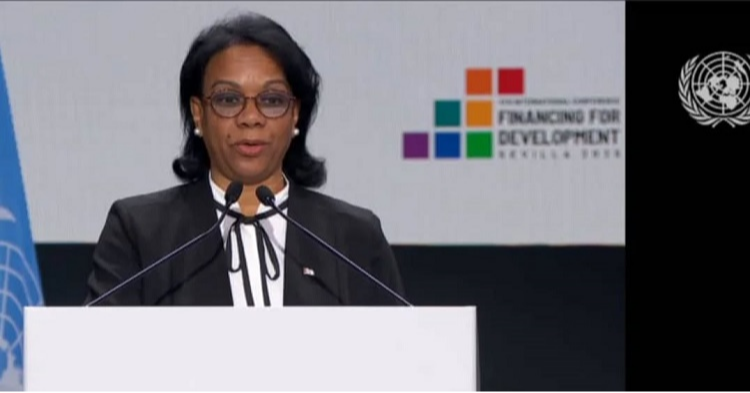Cuba today called for an end to unilateral coercive measures that hinder the development of the countries affected, such as “the unjust and illegal United States blockade.”
In her speech before the Plenary of the United Nations Conference on Financing for Development (FFD4), held in Spain’s Sevilla, Cuban Deputy Prime Minister Inés María Chapman referred to Washington’s economic siege of the Caribbean island, which has been in place for more than 60 years.
“It is urgent that we promote concrete actions that will result in the end of these measures that violate the UN Charter and international law,” Chapman emphasized.
After mentioning the previous meeting in Ethiopia 10 years ago, she emphasized that the Seville meetings are facing an extremely complex global context, marked by wars and threats of war, with international law and multilateralism under threat, along with questions about the usefulness of the United Nations.
“(…) a profoundly unjust, undemocratic, and exclusionary international order prevails, favoring the wealthy, and where we are told, without hesitation, that Official Development Assistance will continue to decline to finance the arms industry,” Chapman stated.
The high representative of the Cuban government posed several questions to the FFD4 delegates regarding the $2.7 trillion annual spending by developed countries on arms, while countries in the South struggle to survive amidst crushing debts and unfulfilled promises.
She also questioned the fact that banks are rescued in a matter of hours, but “the minimal commitments we made when approving the 2030 Agenda for Sustainable Development will not be met due to lack of financing.”
Furthermore, the Cuban Deputy Prime Minister pointed out how incomprehensible it is to eliminate essential financing for the survival of the Palestinian people, victims of genocide by Israel.
The Cuban official also recalled that the people of Haiti are still waiting for resources and cooperation for their development, while praising the opportunity offered by the Seville Conference to address these long-standing questions and advance the global agenda.
Ines Maria Chapman opined that the fragile consensus proposed in the Final Document of the 2030 Agenda for Sustainable Development demonstrates that positions contrary to the true development of the South have become entrenched this decade.
“Nor is there progress, as required, in the reform of international financial institutions. “It’s time to understand that developing countries are not looking for handouts; we demand fair and inclusive treatment,” he added.
Furthermore, he took the opportunity to highlight the existence of serious threats to international peace and security, the most recent example of which is the aggression by Israel and the United States against Iran, “which we strongly condemn.”


